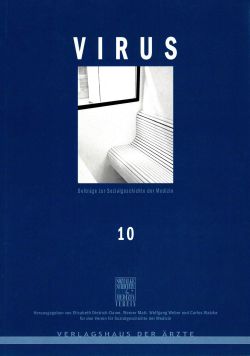
VIRUS Band 10, pp. 011-033, 2020/08/04

Members of the Medical Faculty of Graz University showed conspicuous efforts in thelocal university extension. Right from the start, there were not only regularpresentations. Administrative activities were also clearly visible. Both ways ofcommitment could also partly be traced in predecessors, competitors andsupplementary initiatives around the university extension. All in all, full professorsshaped the movement. Topics were drawn from a rich repertoire of numerousbranches of scientific and applied medicine. Overlapping subjects, especially as far asnatural science is concerned, need further consideration. Illnesses and academicallyaccredited methods to cure them demanded broader space than general preventivemeasures. In dealing with infections, provisions for public health are evident.Summarily, motives of the philanthropic popularisation of knowledge on health careare represented and competed with professional ambitions of scientists and physicians.As competition grew in the interwar period, the competitors included those strata ofsociety that had not been convincingly integrated in the university extension; namelyworkers and farmers can be named in this context. Moreover, “bourgeois”concurrence showed more practical approaches. This character might also be statedregarding social services and their informal ways to popularise knowledge. Politicaltraits surfaced right at the beginning of the educational movement. German-nationalistand liberal positions prevailed. Trends of radicalisation can be particularly observed inthe field of racial hygiene. Starting at the end of World War One, these tendenciesintensified in the 1930ies. Moderate efforts in the local university-extension movementduring the war must be assessed against the background of war-related teaching andthe increased commitment in (field) hospitals. The case of Oskar Zoth finallydemonstrates how the Medical Faculty even joined political agitation. Furthermore ithints at means which were used to popularise knowledge.
Keywords: University Extension, Graz, Habsburg Monarchy, World War One, Fin de Siècle, Interwar Period, Popularisation of Knowledge, Public Health